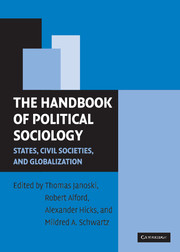Book contents
- Frontmatter
- Contents
- Preface
- Contributors
- Political Sociology in the New Millenium
- PART I THEORIES OF POLITICAL SOCIOLOGY
- PART II CIVIL SOCIETY: THE ROOTS AND PROCESSES OF POLITICAL ACTION
- PART III THE STATE AND ITS MANIFESTATIONS
- 18 State Formation and State Building in Europe
- 19 Transitions to Democracy
- 20 Revolutions and Revolutionary Movements
- 21 Regimes and Contention
- 22 Theories and Practices of Neocorporatism
- 23 Undemocratic Politics in the Twentieth Century and Beyond
- 24 State Bureaucracy
- PART IV STATE POLICY AND INNOVATIONS
- PART V GLOBALIZATION AND POLITICAL SOCIOLOGY
- References
- Name Index
- Subject Index
18 - State Formation and State Building in Europe
Published online by Cambridge University Press: 05 June 2012
- Frontmatter
- Contents
- Preface
- Contributors
- Political Sociology in the New Millenium
- PART I THEORIES OF POLITICAL SOCIOLOGY
- PART II CIVIL SOCIETY: THE ROOTS AND PROCESSES OF POLITICAL ACTION
- PART III THE STATE AND ITS MANIFESTATIONS
- 18 State Formation and State Building in Europe
- 19 Transitions to Democracy
- 20 Revolutions and Revolutionary Movements
- 21 Regimes and Contention
- 22 Theories and Practices of Neocorporatism
- 23 Undemocratic Politics in the Twentieth Century and Beyond
- 24 State Bureaucracy
- PART IV STATE POLICY AND INNOVATIONS
- PART V GLOBALIZATION AND POLITICAL SOCIOLOGY
- References
- Name Index
- Subject Index
Summary
In political sociology, state building is usually understood to mean the process by which states are created and then establish and consolidate their monoply of legitimate violence over a given territory by constructing a durable administrative, financial, judicial, and military apparatus. Though the first examples of state building in the widest sense may have occurred more than four thousand years ago in the ancient Near East and China, it was post-Roman state building in Western Europe, lasting from about the fifth century a.c.e. until the end of the Napoleonic period, that brought forth the modern state with a modern bureaucratic infrastructure at its heart. As the progenitor of a state form that has since been adopted or imposed on the rest of the globe, the case of European state building is of more than just historical interest. It reveals to those nations in Africa, Asia, and Latin America still grappling with problems of state consolidation the tremendous difficulty of erecting honest, efficient, and legitimate infrastructures while at the same time suggesting a variety of ways in which this may yet be achieved.
Sociologists and political scientists in the English-speaking world took up the task of explaining the process of state building in Western Europe in an intensive way beginning in the 1960's. A new concern to “bring the state back in” to the social sciences inspired a series of field-defining works by Reinhard Bendix, Barrington Moore, Stein Rokkan, Charles Tilly, Michael Mann, Perry Anderson, Immanuel Wallerstein, and others that were themselves inspired by the older writings of Max Weber, Otto Hintze, and Karl Marx.
Information
- Type
- Chapter
- Information
- The Handbook of Political SociologyStates, Civil Societies, and Globalization, pp. 367 - 383Publisher: Cambridge University PressPrint publication year: 2003
Accessibility standard: Unknown
Why this information is here
This section outlines the accessibility features of this content - including support for screen readers, full keyboard navigation and high-contrast display options. This may not be relevant for you.Accessibility Information
- 1
- Cited by
